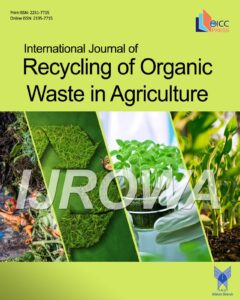Effects of organic amendment on some soil physicochemical characteristics and vegetative properties of Zea mays in wetland soils of the Niger Delta impacted with crude oil
Authors
- Francis E. Egobueze 1
- Josiah M. Ayotamuno 2
- Chukwujindu M. A. Iwegbue 3
- Chibogwu Eze 1
- Reuben N. Okparanma 2
Abstract
Purpose This study sought to investigate the effects of organic amendments on the degradation of hydrocarbons and vegetative properties of Zea mays grown in crude oil-contaminated wetland soils of the Niger Delta, Nigeria.
Methods Two soil types were investigated, namely, fadama soil (oxisol) and swamp forest soil (utisol). For each soil type, 48 treatment cells and 1 control containing 1 kg of soil each were spiked with crude oil at concentrations ranging from 50 to 200 g kg−1, representing 5–20% (m/m) contamination levels, respectively. Then, 5 days after the contamination, the soils were amended with cow dung (CD), poultry waste (PW), and palm oil waste (POW). The ratios of soil to organic amendments used were 1:1 and 2:1. The soils were tilled and irrigated regularly, and monitored for a total period of 112 days. The same conditions were used to investigate the vegetative properties of Z. mays in these oil-contaminated soils with organic amendments.
Results The total organic carbon (TOC) and pH increased significantly within the first 2 weeks after crude oil contamination; thereafter, the pH of the soil decreased significantly over incubation time, while there was steady increase in TOC with incubation time. The percentage nitrogen and total petroleum hydrocarbons (TPH) decreased significantly. The utisol soil showed better plant performance, despite the lower hydrocarbon degradation rate.
Conclusion The organic amendments showed a TPH degradation trend that followed the order: PW>CD>POW. They also improved the seed emergence of Zea mays.



